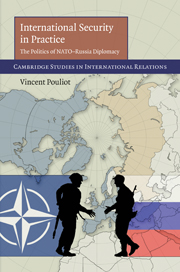Book contents
- Frontmatter
- Contents
- List of Figures and tables
- Preface
- Abbreviations
- 1 Introduction
- Part I Restoring the practical logic of peace
- 2 The logic of practicality: a theory of practice of security communities
- 3 A “sobjective” methodology for the study of practicality
- Part II The symbolic power politics of NATO–Russia diplomacy
- 7 Conclusion
- Bibliography
- Index
- Cambridge Studies in International Relations
3 - A “sobjective” methodology for the study of practicality
Published online by Cambridge University Press: 03 May 2010
- Frontmatter
- Contents
- List of Figures and tables
- Preface
- Abbreviations
- 1 Introduction
- Part I Restoring the practical logic of peace
- 2 The logic of practicality: a theory of practice of security communities
- 3 A “sobjective” methodology for the study of practicality
- Part II The symbolic power politics of NATO–Russia diplomacy
- 7 Conclusion
- Bibliography
- Index
- Cambridge Studies in International Relations
Summary
This chapter seeks to map out the main lines of a methodology specifically geared toward a constructivist approach centered on practices. In keeping with the argument put forward in Chapter 2, my objective is to overcome the representational bias by systematically restoring the practical logics of international politics and social life in general. The “sobjective” label intends to convey the central idea that constructivist inquiries need to develop not only objectified, but also subjective knowledge about social and international life. As Bourdieu famously explains, both forms of knowledge “are equally indispensable to a science of the social world that cannot be reduced either to a social phenomenology or to a social physics.” The methodology outlined below offers practical guidance as to how to achieve such a sobjective-with-an-o social science.
Methodology is, according to one prominent observer, “the major missing link in constructivist theory and research.” Another leading scholar concurs that “the time is ripe for further debate about best practices for those working with discourse and texts.” Indeed, constructivists have yet to devise a distinct modus operandi designed to study the social construction of meaningful realities. This is not to deny the commonly held view that “constructivist analysis is compatible with many research methods currently used in social science and political science”; indeed, I would argue that constructivism does not require the development of brand new methods. That said, the approach would certainly benefit from engaging more systematically and coherently with pressing methodological issues.
- Type
- Chapter
- Information
- International Security in PracticeThe Politics of NATO-Russia Diplomacy, pp. 52 - 92Publisher: Cambridge University PressPrint publication year: 2010

